CLAS 357
The Golden Ass (cont.)
April 24, 2024
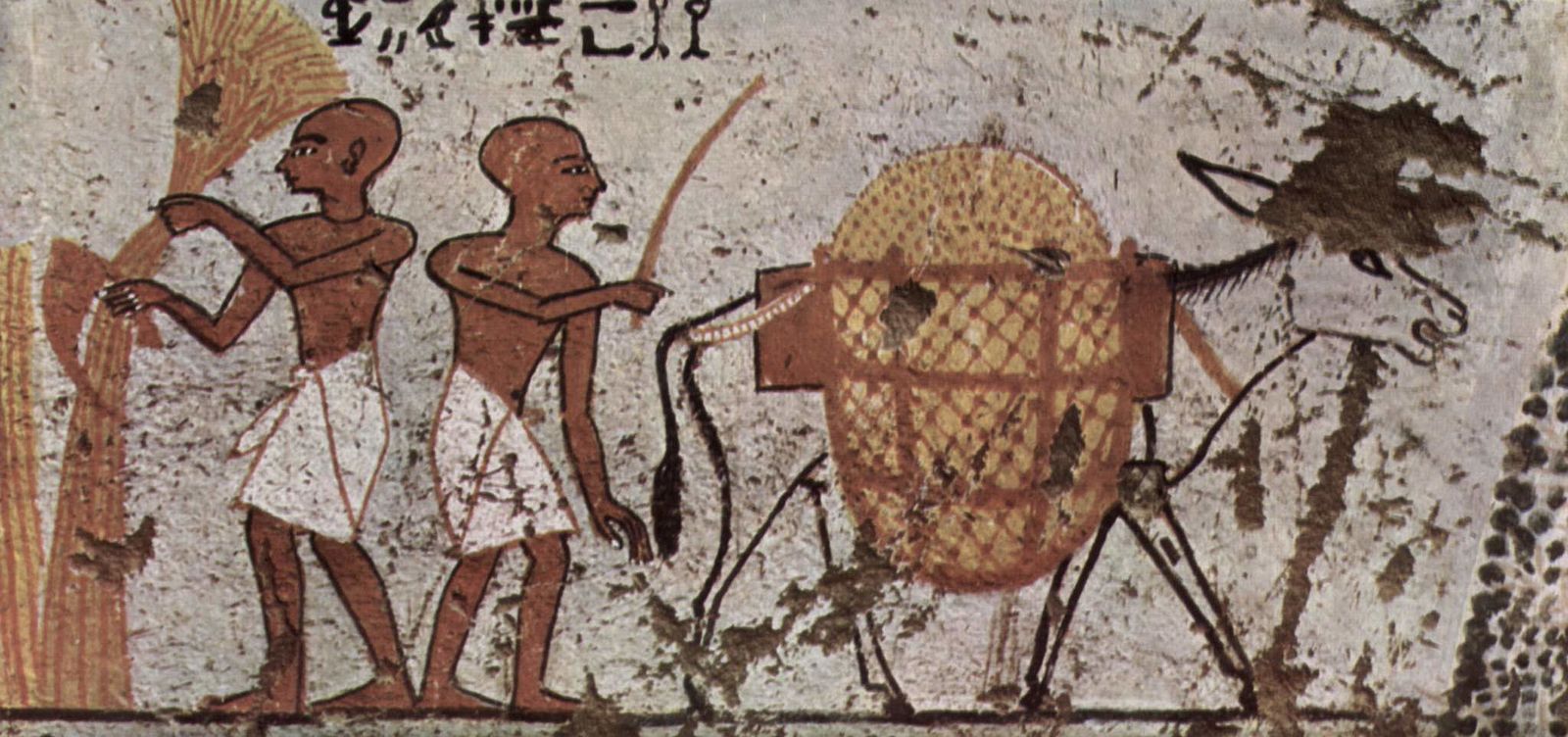
Donkey & Farmers (Tomb of Panehsy, Upper Egypt, 13th century BCE)
Response #3 Topics (due May 1, 11:59pm in D2L)
Study Guide for Final examination (Monday, May 6, 10:30am-12:30pm)
Cupid & Psyche (cont.)
- Psyche as fugitive slave in divine comedy (Mercury's announcement, "As a reward for his information, he shall receive from Venus in person seven delicious smooches and as a super-sweetener bonus, a thrust from her honeyed tongue", 6.8)
- Psyche surrenders to angry Venus ("The parties to the 'marriage' come from classes that can’t intermarry. Also, the thing took place out in some country house without witnesses, and the groom’s father didn’t consent, so the union can’t be regarded as legal. It’s an llegitimate child who’s about to be born, if in fact we let you go through with the birth at all", 6.9)
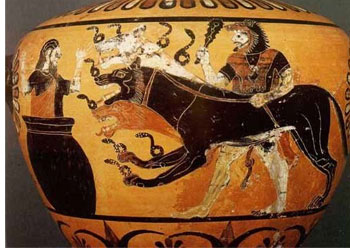
Cerberus & Hercules (black-figure hydria, ca. 530 BCE)
- slavish tortures & trials: separating seeds, retrieving tufts of golden wool, collecting water of River Styx, katabasis (Proserpina's beauty creme)
The Golden Ass 6.20 (return from the mysterious underworld)
Her return from the underworld was considerably more animated than her descent had been. She regained the upper world and paid the bright daylight its due salute, but although she was in a hurry to complete her service, a rash curiosity seized her reasoning. ‘Look here,’ she said, ‘aren’t I silly, as a courier of this divine gorgeousness, if I don’t take just a tiny dab for myself ? It might please my gorgeous lover, after all.'
- happy ending: provident Jupiter won over by Cupid's appeal (promise of "a lass of particularly powerful loveliness", 6.22); Psyche made immortal to legitimize marriage (6.23); wedding reception, Pleasure (Voluptas) born – allegory: human soul assisted by love > divine forgiveness & providence/immortality/pleasure/ultimate mystery
- echoes of Platonic thought: human soul aspires to be divine, love bridges divine & human worlds; human Soul craves ideal Love > philosophy (Greek) = "love of wisdom"
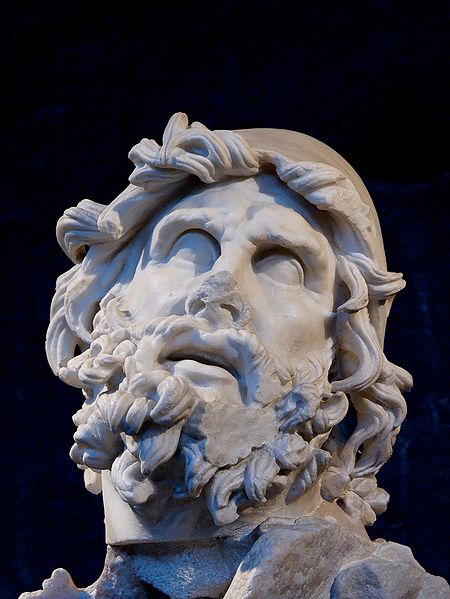
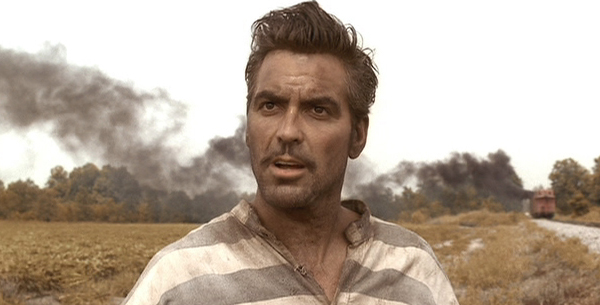
L: Sperlonga Odysseus; R: "Man of Constant Sorrow" Ulysses Everett McGill in O Brother, Where Art Thou? (2000)
- Psyche a mythic precursor of Lucius’ wanderings/journey: insecure, curious, vulnerable (representative?) human being on "Odyssey" (slavery, random fortune, trials, suffering, chaos & cruelty) > connecting to "something bigger", otherworldly divine influence = mystery
- Ass-man's trials & travails/Odyssey commence (end of The Golden Ass 6): robbers' plan for Charite after failed escape? (rejection of proposals for burning alive/being tossed to beasts/crucifixion – official Roman punishments)
The Golden Ass 6.31-2 (blurred line between humans and beasts – trifecta of torture)
'I hope you'll consent to cut his throat on the morrow, empty him of his innards, and sew the naked girl into his belly—he prefers her to us, so let him have her. Her face alone can show, while the rest of her is secured in that bestial bond. Then, when the ass is stuffed like a goose or a sausage, we can set him out on a jagged rock, abandoning him to the burning, broiling sun . . . The girl will feel the bites of wild things as worms mince her limbs; and scorching flames when the overheated sun ignites his gut; and the torture of the cross when dogs and vultures pull out her guts—which are his—and his guts—which are her.'
- The Golden Ass 7-8: Lucius' journey through Greco-Roman world (disorder, mistrust, lawlessness, corruption, cruelty, malevolent forces)
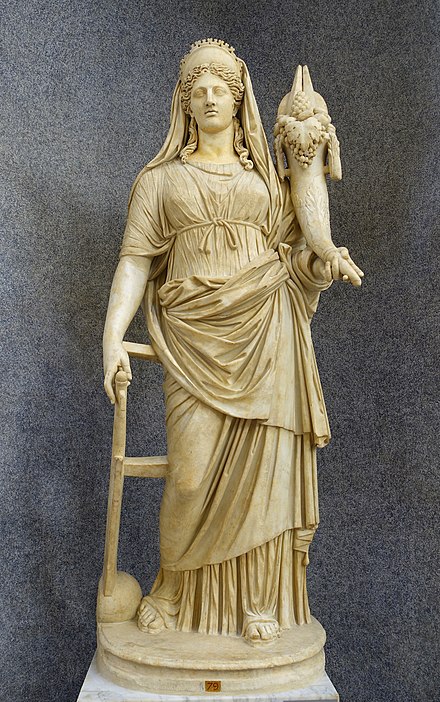
Bona Fortuna (early 1st century CE)
- Lucius awaits Charite's grotesque entombment: Fortune's blindness/randomness
The Golden Ass 7.2 (Lucius learns he's blamed for robbery at Milo's)
As he told this story, I compared the former Lucius, that darling of fate, to the abysmally wretched ass I presently was. My groans reverberated to the marrow of my bones. It occurred to me that in the learned writings and great art of old, Fortune is blind—or has her eyes gouged out, which gives us no hope she’ll ever see. She always bestows her riches on the wicked and undeserving, and never uses sound judgment in singling out any mortal. Just the opposite: she habitually makes herself at home with those she ought to run the farthest from—but of course she can’t see them to run from them. And as if that weren’t bad enough, she also gives us reputations diverging from the truth, or even emerging 180 degrees from it, so that an evil man gloats because he’s known as a good one and the purest hearted is beaten about the head and shoulders with talk that he’s a criminal.
- Charite: Tlepolemus (aka "Haemus"), fiancé-in-disguise, joins robbers; embedded Greek novel plot (tragically subverted)
Golden Ass 7.10 (Ass-man misjudges Charite)
But she! As soon as she saw the young man and heard mention of a brothel and a pimp, she started to laugh and wiggle ecstatically, so that I felt justified in condeming the entire sex. This girl had pretended to be in love with an eligible youth and full of longing for a faithful marriage, and now she was suddenly exulting when the word whorehouse—a squalid, sordid whorehouse—reached her ears. At that moment, the character of all women, as a class, was subject to a donkey's censure.
- rescue & tragic conclusion of Charite's story told by slave ("I want you to know the whole story, and I'll tell you from the beginning what happened. It's the kind of things better-educated people, Fortune's chosen authors, would be the right ones to commit to paper and make into your ideal tale", 8.1): Thrasyllus & Tlepolemus – boar hunt?
Golden Ass 8.6 (funeral after murder of Tlepolemus)
He hugged the body he'd just made a cadaver, as if he couldn't get enough, and went through a whole roster of proper mourning; he was good at it, except his tears wouldn't appear and perform their function. As we were doing our sincere lamentations, he blamed the animal—but his own hand had done the crime.
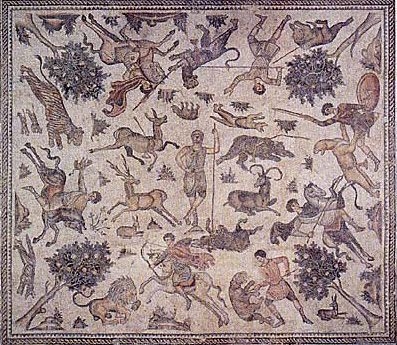
Worcester Hunt Mosaic (Byzantine, 6th century CE)
- Charite's mourning & ghost of husband ("you knew this was coming", 8.8), her tragic plot ("With a man's courage and a swoop straight out of hell, she moved on the murderer", 8.11)
- Ass-man, book 7: briefly pampered as savior-ass; herdsman & failed attempt to have sex with mares; hauling wood for boy in mountains ("quite certainly the worst boy in existence", 7.17)
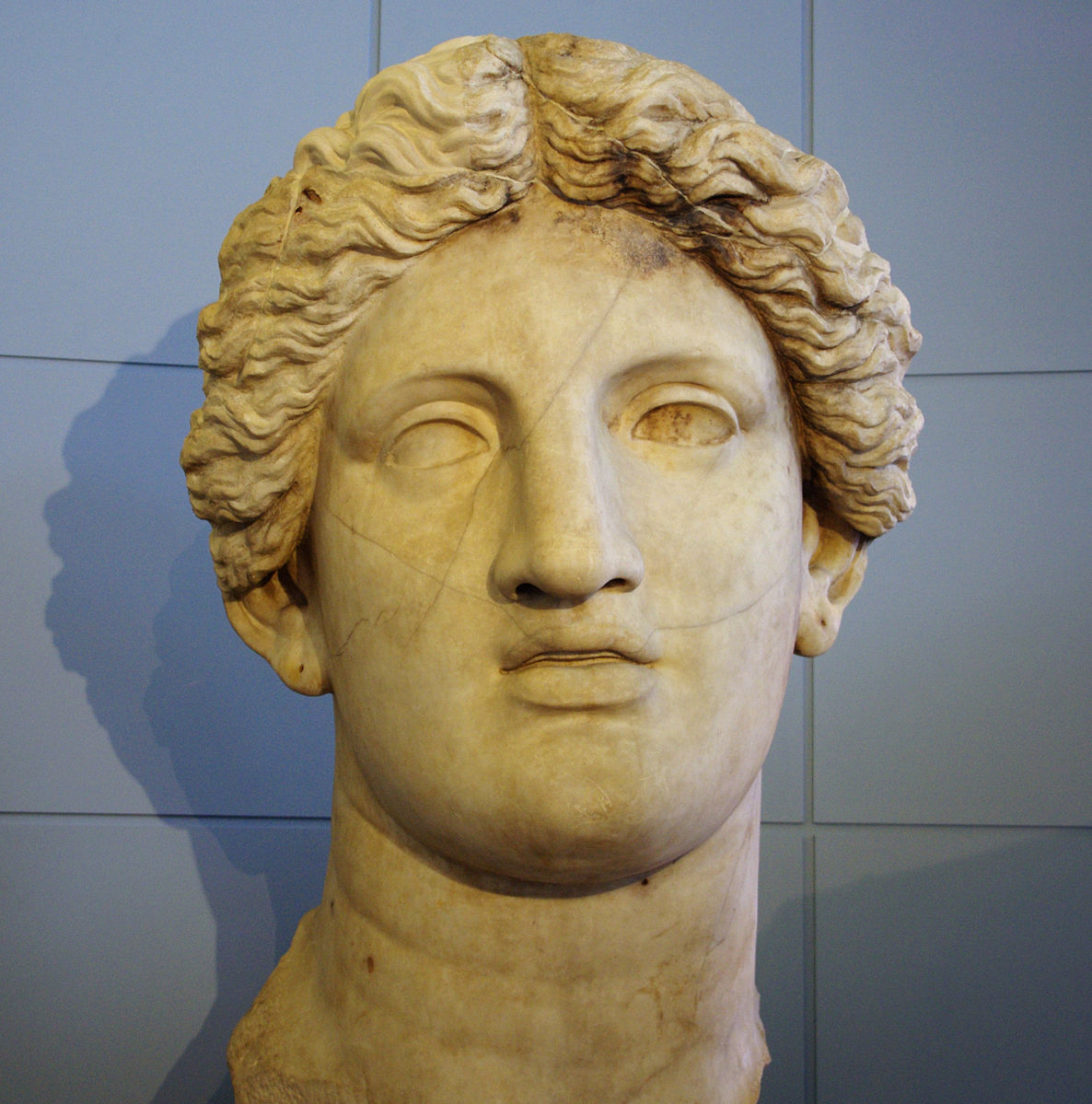
Fortuna Huiusce Diei (Fortune of the present day) (ca. 100 BCE)
- Mala Fortuna's reign: random & calamitous events/wanderings (boy sets Ass-man on fire, false accusation of sexual assault, threat of castration); "rescue" by bear ("I dedicated myself wholeheartedly to fleeing that monstrous bear and that boy who was worse than the bear., 7.24)

Bear mosaic (Tunisia, 3rd century CE)
- The Golden Ass 8 – migration: household slaves become refugees (death of Charite & Tlepolemus) ; mauled by farmers' dogs (8.17) after being warned about monstrous wolves
The Golden Ass 8.16-17
Perhaps the wolves were frightened off by the massed young men’s racket; more likely, it was the glaring torchlight—or maybe they were footpadding elsewhere. In any case, they made no attack on us; they didn’t even come into distant view. But then, at an estate we chanced to pass, the farmers decided that such a large group must consist of robbers. They got quite worked up on behalf of their possessions, and enormously agitated. With the usual whooping and every variety of yelled command, they urged their dogs on against us: these were huge, slavering, and more ferocious than any wolves or bears. Born savages, carefully fostered up for garrison duty and now egged on and driven to a frenzy by their owners’ uproar, they poured around us from all directions, lunged up everywhere, and indiscriminately mangled people and pack animals alike . . . And now there followed a piece of bad luck even bigger than this major danger. From their rooftops and a hill close by, those country-folk suddenly hurled stones, leaving us to which disaster demanded a readier defense—the hand-to-hand combat with dogs, or the rock artillery.
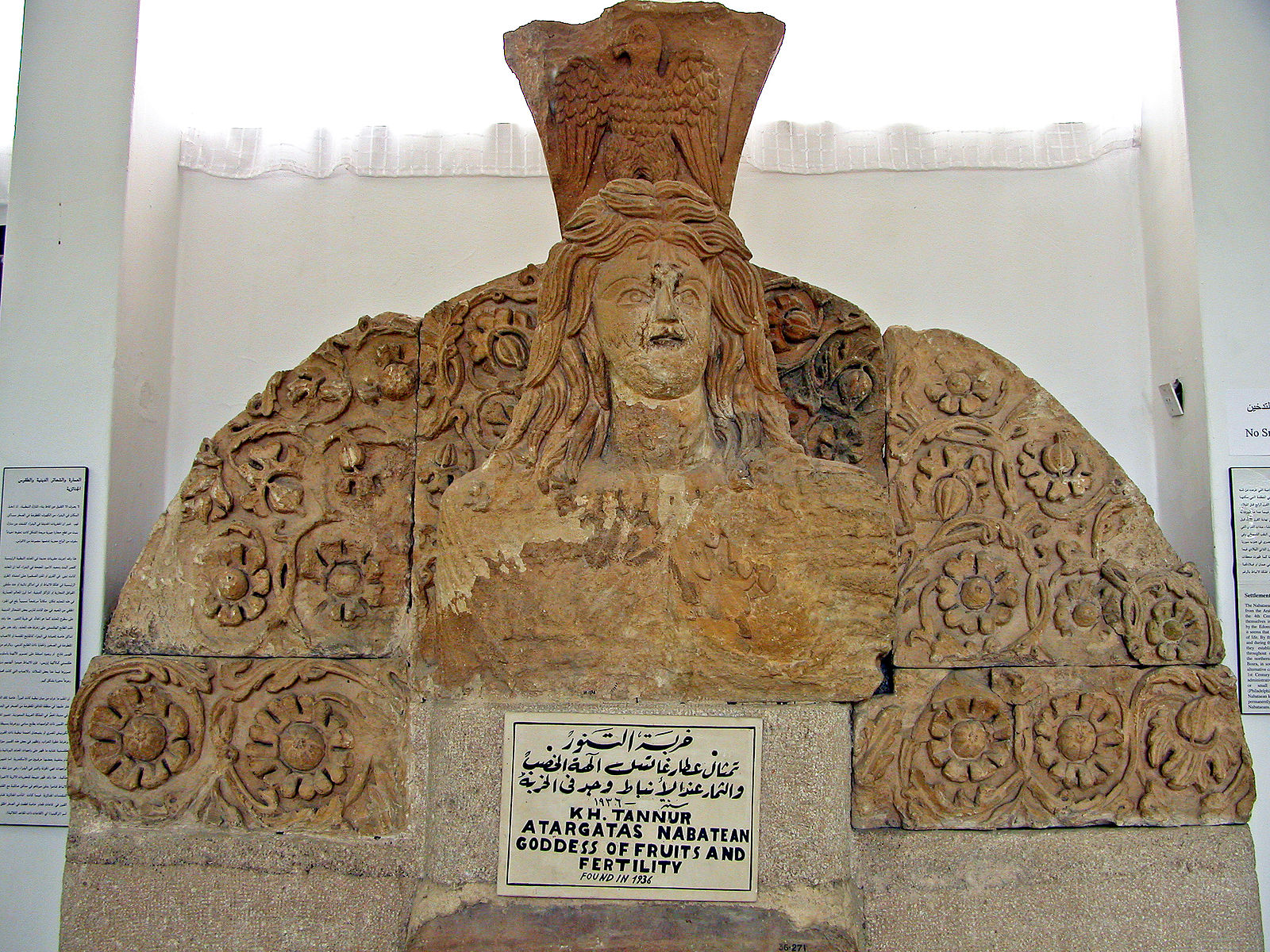
Statue of Artargatis (Nabatean temple, Khirset Tannur, Jordan, 1st century CE)
- Ass-man auctioned off to to priest (Philebus) of Syrian Goddess (= fertility goddess Atargatis) in quasi-slave market
The Golden Ass 8.24-5
In his unseemly eagerness to make a deal for me, this man asked the auctioneer my nationality. He said I was a Cappadocian, up for anything. The second question concerned my age. The auctioneer waggishly replied, “The astrologer who cast his horoscope calculated that he was four, but I assume he himself knows for sure: it’s information he has to give the census takers, after all. Okay, they could have me up under Cornelius’s law if I knowingly sold you a Roman citizen as a slave, but I’ll take the risk. Why not buy this fine, serviceable chattel, who’s good for outdoor and indoor duties?” On it went, with the putrid purchaser not pausing but posing one question after another, and at last querying anxiously how tame I was. The auctioneer responded, “It’s not an ass you’re looking at but a castrated ram, gentle at any work, not a biter, not even a kicker. You’d actually think a decent human being had taken up residence in an ass’s hide. You want proof ? Easy: if you stick your face between his haunches, you can see for yourself—what a big capacity he shows for getting through all the tasks you’ll have for him."
- grifting priests' traveling salvation show: divine inspiration, dancing & music, self-flagellation, prophecies, collections; sex-cult with young male sex-slave (cf. Bacchanalia) – prospect of bestiality (end of book 8)
The Golden Ass 8.27 (satire of priest's mysteries)
They wrapped the goddess in a small cloak made of Chinese silk and loaded her on for me to carry. They bared their own arms clear up to the shoulders, hoisted enormous swords and axes, and sprang forth, yelling, “Euan!” The reed pipe goaded them into a demented quickstep. They made the rounds of quite a few cottages before arriving at a wealthy man’s country estate. As soon as they came to the outside gate, they flew forward with frantic-sounding, discordant howls. They put their heads down and for a long time whipped their necks around slickly and whirled their loose, long hair. At intervals, they attacked their own flesh with their teeth, and at last each took the double-edged sword he carried and cut up his own arms. Amid all this, one of them went more lavishly wild and, panting rapidly from deep in his lungs as if overflowing with divine inspiration, he mimicked a visitation of madness—exactly as if the immanence of the gods did not make men better but instead broke them down or filled them with disease.










